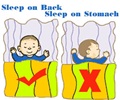Golden staph bacteria might be behind sudden death of infants, Australian researchers say.
Golden staph bacteria might be behind sudden death of infants, Australian researchers say.
The SIDS (Sudden Infant Death Syndrome), sometimes known as “crib death,” describes the sudden and unexpected death of a healthy baby which cannot be explained, even after all possible causes have been ruled out.SIDS is the leading cause of death in babies between 1-12 months of age. It kills an average of 65 babies a year in Australia.
Now research from Adelaide's Women and Children's Hospital has found that a possible cause of Sudden Infant Death Syndrome (SIDS) has been overlooked.
The study found that a strain of golden staph bacteria could be a trigger for the syndrome.
Associate Professor Paul Goldwater says he analysed the post mortem reports of more than 190 babies over a 25-year period to come to his conclusion.
"We believe that these pathogens are actually causing infection and they may be the cause of SIDS," he said.
Advertisement
"Staph always is one of the leading ones and we found it in about 10 per cent."
Advertisement
"What's of particular note is that staph aureus, this golden staph, very commonly carries lethal toxins and as part of our research we found two-thirds of SIDS infants actually carry these lethal toxins in their intestines, as it happens," he said.
He says this could not only be a trigger for SIDS, but also be the cause which has been overlooked up until now.
Godwater’s study, published in Archives of Disease in Childhood, concluded that microbiologists ought to be consulted at the autopsies of babies before a finding of SIDS was recorded.
"This work provides a diagnosis for their baby - and it's much easier to live with a diagnosis than having this mystery hanging over them, wondering why their baby died," he said. "SIDS is a cop-out diagnosis - it doesn't provide you with a cause."
But he said it was unclear how many babies, if any, who had died after an infection could have been saved by earlier treatment.
"Because they die unexpectedly and suddenly, it's extremely hard to deal with," he said. "Certainly antibiotics would not be the way to deal with this," he felt.
"Also in terms of the care of the baby, the sleeping surface is very important and babies should not be put down to sleep on sofas or in the parents' bed because these are heavily contaminated sites, heavily contaminated with pathogenic bacteria," he said.
"And of course the recommendation is to put the baby down on their backs.
"We think the association with prone sleeping is that the baby is more likely to ingest or get colonised with these bacteria if their face is in contact with the sleeping surface."
However, one criticism of the study is that the cases were drawn over a long time span.
"Unfortunately or fortunately depending how you look at it, the comparison deaths are quite rare and so we have to look over a long period of time," Professor Goldwater said.
Despite this however, he is extremely confident that this particular golden staph bacteria is a cause of SIDS and he also thinks other bacteria could be involved as well.
"There's strong evidence that viruses probably play a role as a co-factor," he said.
"My PhD student Amanda Highet is doing genetic studies as well as the bacterial toxin studies and has had some very interesting findings with some genes that we believe make SIDS babies more susceptible to these bacterial toxins.
"And her preliminary data shows a very strong correlation with two particular gene mutations."
That meant there could also be a genetic factor involved in SIDS deaths, Goldwater told ABC TV.
"When you put all of these factors together that's when the baby is at risk," he said.
Source-Medindia
GPL/L










